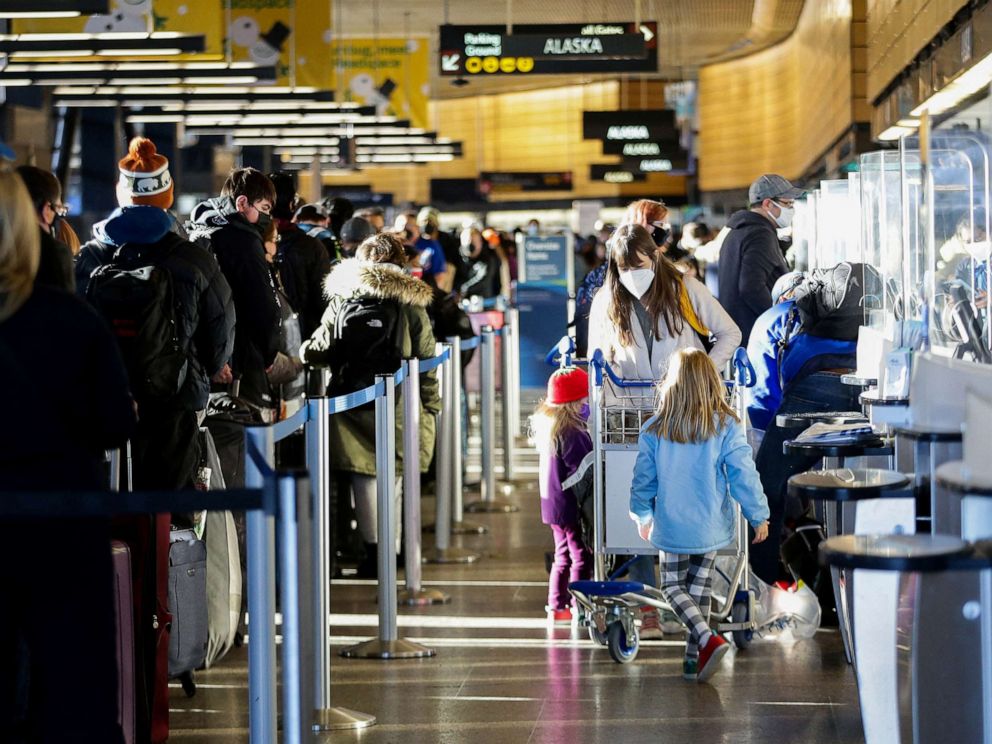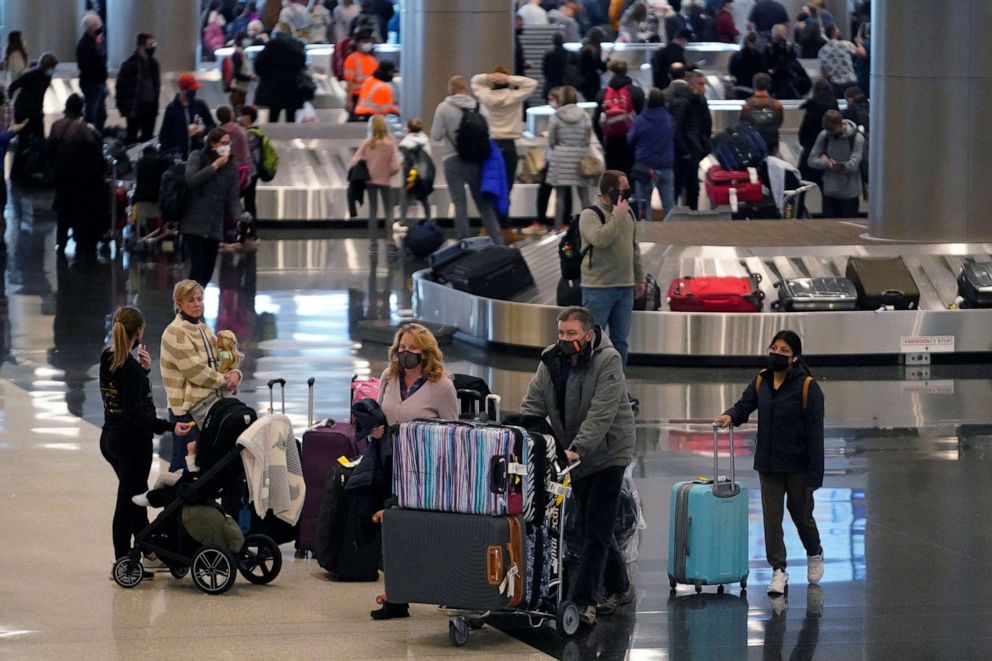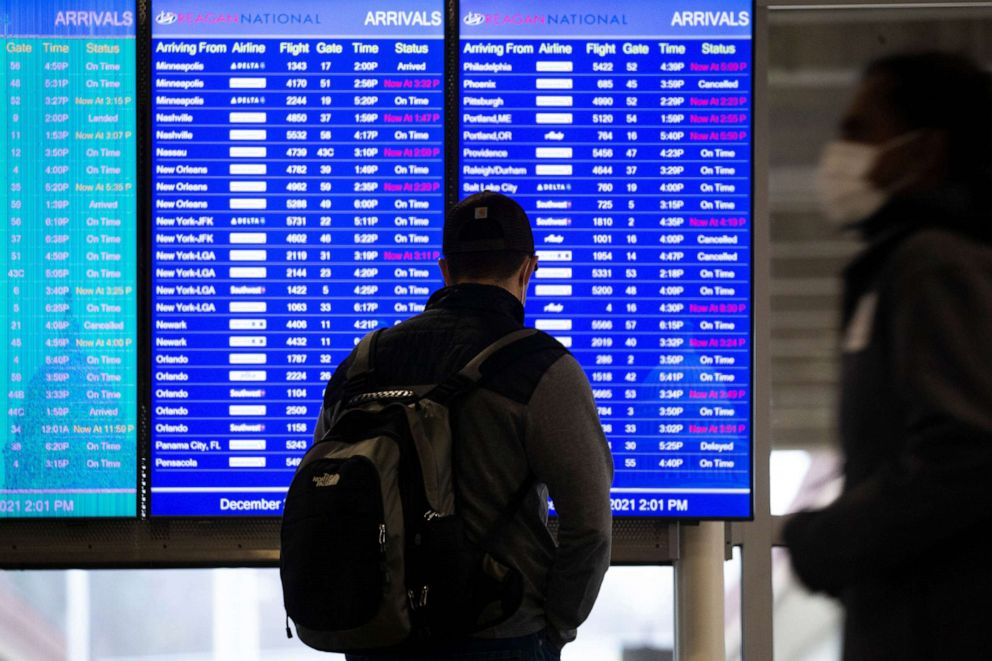Bad weather, COVID cases fuel 6th day of mass flight cancellations
Alaska Airlines is urging passengers to consider rescheduling their trips.
Winter weather and COVID-19 cases among flight crews have pushed the nationwide travel nightmare into its sixth day.
About 7,000 flights with at least one stop in the U.S. have been canceled since Christmas Eve, according to FlightAware. As of 7 p.m. Wednesday, cancellations for the day were already at more than 990 -- and creeping up fast.
Alaska Airlines is now urging passengers to consider rescheduling their nonessential holiday flights.
"We strongly urge flyers with non-essential travel scheduled before January 2, 2022, to consider changing their travel to a later date using our flexible travel policy," the airline said in a statement.
Alaska, which has a major hub in Seattle, has been slammed by both bad weather in Seattle and the omicron variant surge. The airline says it is proactively cutting Seattle departures by 20% for Wednesday and Thursday but that the weather is affecting operations beyond the Pacific Northwest.

Seattle-Tacoma International took the No. 1 spot on Wednesday for the airport with the most flight cancellations in the world. On its website it says, "staffing issues may bring further delays in operations."
"This has been exasperating for travelers impacted by snow," the airport tweeted on Tuesday. "We’re sorry. Hang in there. Stay in touch with your airline on delays/cancellations. If you need assistance rebooking your travel, only come to the airport if you have a confirmed flight and departure time."
Delta Air Lines is also feeling the one-two punch of the weather and omicron.
"Winter weather and conditions in the Pacific Northwest, Midwest and the omicron variant are continuing to hamper operations," Delta said in a statement Tuesday.
The airline canceled 129 flights Wednesday and delayed more than 600 others. Delta says it will be offering eCredit vouchers to affected customers.

U.S. airlines and travelers got their first sign of possible relief from the dayslong crush of canceled flights on Monday when the Centers for Disease Control and Prevention shortened the isolation period for asymptomatic and fully vaccinated individuals who contract COVID-19 from 10 days to five.
JetBlue also said late Wednesday it was proactively reducing its schedule through Jan. 13. The airline also expects crew cases and cancellations will surge in the coming weeks. It had canceled another 99 flights on Wednesday through 7 p.m. ET.
"While the new CDC guidelines should help get crewmembers back to work sooner, and our schedule reduction and other efforts will further ease day-of cancellations, we expect the number of COVID cases in the northeast -- where most of our crewmembers are based -- to continue to surge for the next week or two," JetBlue said in a statement. "This means there is a high likelihood of additional cancellations until case counts start to come down."
Delta, which was the first airline to ask the CDC to shorten the isolation period to five days, said on Monday that it was already working to implement the new guidance.
But experts warned it may take some time to figure out the specific return-to-work protocols with the multiple agencies involved.
"The airlines are eager to implement this," aviation expert Henry Harteveldt told ABC News. "But as with everything we see the initial ruling, we start to apply it and then the reality of the real world, the operating world sets in."
And when the nation will sees an end to these disruptions is also dependent on the spread of omicron cases.

"I'm a little more optimistic that airlines will be able to better manage the rate of cancellations that they have compared to a few days ago," Harteveldt said, "but we can't predict the end of when a lot of their employees will be getting sick because it's a function of how omicron itself is spreading."
The thousands of cancellations couldn't have come at a worse time for the airlines. The holiday rush is far from over with 12.5 million people estimated to pass through U.S. airports from now until Jan. 3, according to the Transportation Security Administration.
"This is a no win situation for everyone," Harteveldt said. "Airlines lose. And passengers lose."




